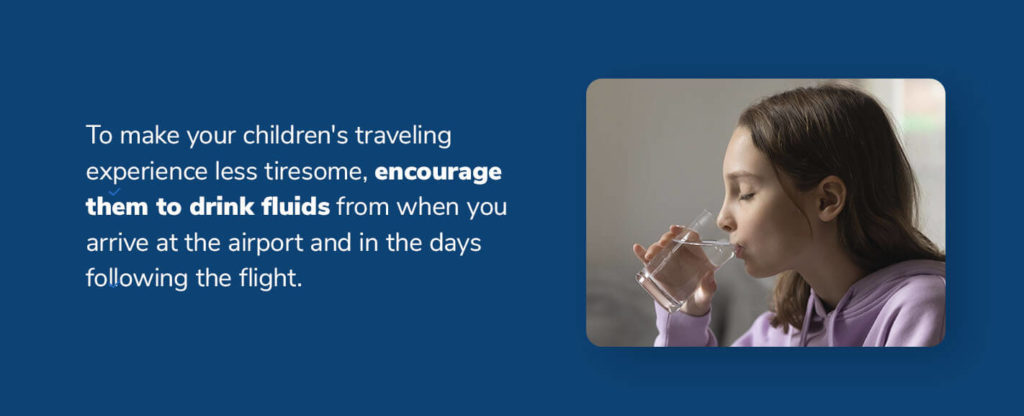The excitement of traveling for a vacation or to visit loved ones is something children remember forever. Hopping onto a plane gives kids a taste of adventure that could last their whole lives! However, the jet lag they feel afterward can take away from the fun they had flying.
Jet lag is not a comfortable feeling for anyone, especially children who want to get the exploring started as soon as they land. A few simple tips on how to get a child over jet lag can help you avoid hanging out with a group of jet-lagged kids on your next trip.
Take a look at the following ideas for how you can help a child with jet lag.
Jump Ahead:
- 3 Ways to Avoid Jet Lag for Kids
- Signs Your Child Has Jet Lag
- How to Help Your Child Get Over Jet Lag
- Find Jet Lag Relief With Mobile IV Medics
3 Ways to Avoid Jet Lag for Kids
Allowing children to adapt to different time zones and preparing for the flight ahead can make your traveling plans easier for the whole family!
Here are three ways you can help your kids avoid jet lag.
1. Slowly Adjust Their Schedule to the Destination’s Timezone
Preparing for the change in time zones is crucial. You might arrive at a destination in the middle of the day, only to realize it’s bedtime at home. Not to worry! Minor changes to your kids’ schedules a few days or a week before your flight can help them adjust to the destination’s time zone.
Helping them adjust to a new time zone is similar to getting your kids ready for the new school year. They had an enjoyable summer where bedtimes were more flexible and they could wake up whenever they pleased. When you see school on the horizon, you may start preparing them for a scheduled start to the day by encouraging a specific bedtime and waking them up earlier in the morning.
This routine also works great for traveling with kids. You can start to adjust their sleep schedules by keeping them up later if the destination’s timezone is behind yours and tucking them into bed earlier if the timezone is ahead. When your children’s circadian rhythms can sync with the destination’s timezone, they will adjust much more quickly to the time difference and feel fewer jet lag symptoms.
2. Encourage Them to Stay Hydrated

Drinking plenty of fluids before, during and after a flight can significantly reduce jet lag symptoms for your children. Studies show that the dry air in airplane cabins can fluctuate the body’s fluid balance, making you feel dehydrated quicker on long-haul flights. Without proper hydration, children and adults can feel an increase in jet lag symptoms which can impact their quality of sleep days after landing.
To make your children’s traveling experience less tiresome, encourage them to drink fluids from when you arrive at the airport and in the days following the flight.
The following fluid guidelines can help your children drink enough water while traveling:
- Babies and toddlers should drink around 4 cups of water or milk each day.
- Children aged four to eight need 5 cups of water per day.
- Children older than eight should drink 7-8 cups of water daily.
Try to stick to these measurements so your children get enough fluids at the airport, flying and after arrival. Hydration is vital for them to avoid the tiredness, appetite changes and mood swings associated with jet lag.
3. Use Lighting to Your Advantage
Light exposure is an excellent tool to incorporate into your child’s daily routine leading up to a flight. Lighting that mimics the time of day at your destination can make adjusting to a different timezone easier for children, similarly to changing their sleep schedules. Light and sleep naturally alter the body’s circadian rhythms, making it easier to become accustomed to your destination’s time zone.
Light exposure can be as simple as turning on your child’s bedroom lights earlier in the morning to wake up or opening their curtains to let natural light inside. If your destination’s time is ahead of yours, try to dim your home’s light earlier in the evening so your kids think it’s closer to their bedtime.
Sun lamps are also great tools to place next to your child’s bed to help them rise earlier or sleep in if needed. These lights work like an alarm clock by gradually becoming lighter as the sun rises at the designated time. This simple adjustment to your child’s morning and night routine can help them avoid the feelings of jet lag after landing.
Signs Your Child Has Jet Lag
If you have traveled with your children before, you may have noticed differences in their mood, appetite or sleep quality after arriving at your destination. Many parents might mix up toddler jet lag symptoms with crankiness or tantrums. Knowing these symptoms can help you learn how to deal with kids’ jet lag after landing.
The most common signs of jet lag you may notice include the following:
- Sleeping too much or not at all
- Not being able to sleep at night
- Feeling tired during the daytime
- Stomach aches, leading to constipation or diarrhea
- Feeling nauseous or sick after landing
- Shifts in their mood
- Loss of focus
How to Help Your Child Get Over Jet Lag
Preventing jet lag can be a trial-and-error process to see which tips work the best for your children. If you find that your kids have some symptoms of jet lag after the flight, there’s no need to worry!
A few simple tips can help move the typical jet lag symptoms along so they can enjoy their trip without fatigue, mood changes and sicknesses:
- Keep them hydrated: Enough water in their system will help restore their fluid balance after flying so they can minimize jet lag symptoms.
- Maintain their nap schedule: If your child still takes regular naps, try to maintain their rest schedule during trips. Try to encourage these naps at a time appropriate in your destination’s time zone to help them adjust to the arrival.
- Try IV drips: If your older children could use extra hydration, vitamins and anti-nausea medicine to help combat flying symptoms, jet lag IV drips can make them feel completely rejuvenated after a flight. Say goodbye to recovering for days with the help of this quick and easy solution.

Find Jet Lag Relief With Mobile IV Medics
If your child could use an extra boost to fight off jet lag symptoms, Mobile IV Medics can help! Our Jet Lag IV Drip Package helps fight fatigue, dehydration, motion sickness and headaches your children might feel after a long flight. With the help of each package’s IV fluid, vitamin B12, vitamin B complex, anti-nausea medicine and anti-inflammatory medicine, your whole family can feel good as new again after arriving at your destination.
Children as young as 11 can enjoy the benefits of our Jet Lag IV Drip Package if they weigh over 100 pounds. Otherwise, the minimum age to receive this treatment and book their first appointment is 12!
Contact us today with any questions about our IV treatments and appointments.





